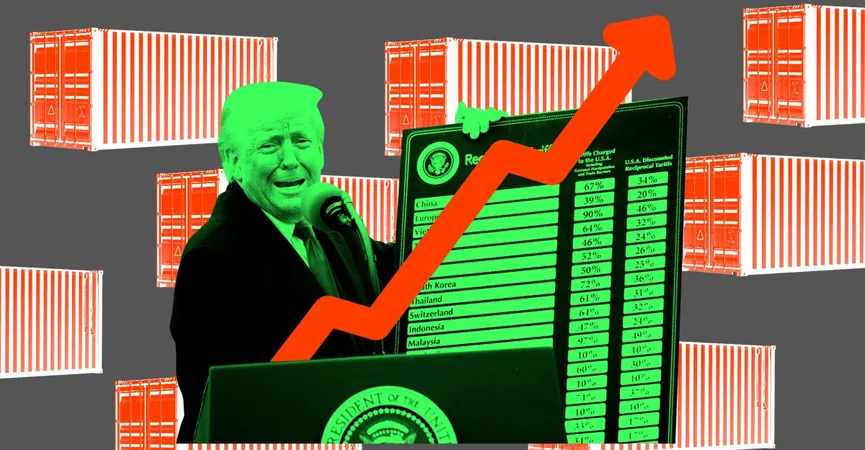
Trump’s Tariffs: A Catastrophe for the Auto Industry and Consumers
2025-04-03
Author: Ming
Introduction
The moment everyone dreaded has arrived: President Donald Trump’s hefty 25% tariffs on imported vehicles took effect last Thursday, sending ripples of panic through the auto industry. Analysts are warning that these tariffs could elevate car prices by as much as $10,000, leaving consumers and manufacturers alike to grapple with the chaotic fallout.
The Myth of American-Made Cars
Trump's rationale for the tariffs—simply telling Americans to purchase domestic cars—ignores a crucial reality: true 'American-made' vehicles are a myth. The average car comprises around 30,000 parts, with 40-50% of those often sourced from countries like Mexico, Japan, and South Korea. Dan Ives, an expert in technology research at Wedbush Securities, points out that this well-intentioned policy could send the already sensitive global auto market into turmoil, inevitably raising prices for consumers.
The Economic Impact of Tariffs
Ives described the tariffs as 'a debacle of epic proportions,' emphasizing that the concept of entirely American-made cars is unrealistic. Further complicating matters, financial researchers at Anderson Economic Group predict that tariffs could raise manufacturing costs by $4,000 to over $10,000 per vehicle depending on the model. Battery-electric crossover SUVs might even see price increases as high as $12,000.
Consequences for Consumers
The effects of the tariffs will hit hardest on the lower end of the market, where affordable vehicles from major manufacturers like GM, Ford, Kia, and Hyundai are primarily built outside the U.S. Already facing an affordability crisis—new cars averaged a transaction price of $48,118 in January—consumers now face a dwindling selection of budget-friendly options, with only 27 vehicles priced under $30,000 as of this year.
Rising Prices and Industry Woes
As tariffs start to change market dynamics, industry analysts warn of average price hikes around $5,300 just as the inventory changes. Erin Keating, an executive analyst at Cox Automotive, described these developments as 'difficult news for an industry already staring down an affordability problem.'
The American Dream at Risk
For decades, car ownership has epitomized the American dream, shaping communities and making vehicles not just a luxury but a necessity for day-to-day life. Unfortunately, the mounting financial burden of car loans is leading many buyers into precarious situations—one in five new car purchasers are opting for seven-year loans, indicative of rising economic stress. With the additional challenge posed by the tariffs, many consumers are at risk of owing more than their cars are worth.
Potential Government Response
In response to the impending crisis, the Trump administration has hinted at potential relief measures, including tax breaks for buyers of U.S.-made vehicles and deregulation efforts to reduce industry-wide costs. However, the effectiveness of these measures remains uncertain.
Consumer Behavior Amidst Uncertainty
As anticipated price increases loom, many are converging on dealerships to take advantage of pre-tariff prices, a frenzy fueled by bad news coverage. Yet experts caution potential buyers against hasty decisions. Jake Fisher, a senior director at Consumer Reports, advises, 'It never pays to rush out and make a rash decision that you might regret.'
Automakers' Strategies
Some automakers are leveraging their existing inventory to offer promotions. Ford, for instance, is providing employee discounts on various models through June 2nd, recognizing an opportunity amidst the chaos. To counter potential impacts, Hyundai has pledged a staggering $21 billion investment in the U.S. Meanwhile, Stellantis has announced temporary layoffs for 900 employees and halted production at some facilities in both Canada and Mexico.
Impact on Electric Vehicle Manufacturers
Even leading electric vehicle maker Tesla is impacted by the tariffs, with 20-25% of its parts sourced from Mexico, raising questions about its long-term pricing strategy.
Conclusion
As every automaker scrambles for solutions, it's clear that Trump's tariffs have thrown the automotive industry into disarray, and it’s likely that he wants to maintain a central role in the chaos he has produced. With uncertainty prevailing and prices soaring, consumers are left reeling in a market where owning a car could soon become a distant dream.



 Brasil (PT)
Brasil (PT)
 Canada (EN)
Canada (EN)
 Chile (ES)
Chile (ES)
 Česko (CS)
Česko (CS)
 대한민국 (KO)
대한민국 (KO)
 España (ES)
España (ES)
 France (FR)
France (FR)
 Hong Kong (EN)
Hong Kong (EN)
 Italia (IT)
Italia (IT)
 日本 (JA)
日本 (JA)
 Magyarország (HU)
Magyarország (HU)
 Norge (NO)
Norge (NO)
 Polska (PL)
Polska (PL)
 Schweiz (DE)
Schweiz (DE)
 Singapore (EN)
Singapore (EN)
 Sverige (SV)
Sverige (SV)
 Suomi (FI)
Suomi (FI)
 Türkiye (TR)
Türkiye (TR)
 الإمارات العربية المتحدة (AR)
الإمارات العربية المتحدة (AR)